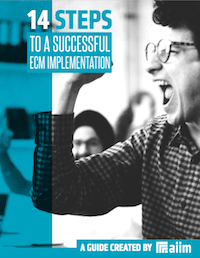The AIIM Blog
Keep your finger on the pulse of Intelligent Information Management with industry news, trends, and best practices.
Capture and Imaging | Enterprise Content Management (ECM)
More than ever before, document management professionals at state and local governments, facility managers in schools and hospital, property managers, first responders, need to manage large format drawings within their electronic content management system (ECM) workflow. These can be active or legacy documents (18 inches or larger) used in conjunction with small documents. How do they manage their hard copy drawings as easily as they manage smaller documents? They are using a wide format scanner to digitize large format assets.
Share
Electronic Records Management (ERM) | Enterprise Content Management (ECM)
I recently attended a meeting of the Chicago chapter of AIIM, where a stimulating panel discussion on the future of ECM and records management took place. I wish I had recorded the conversation, but I took some great notes that I wanted to share with you all.
Share

Making an ECM implementation successful requires planning and attention to detail. The best way to create the right solution is to identify organizational goals and priorities. Learn how to manage a successful implementation in our free guide.
Enterprise Content Management (ECM)
Please enjoy this roundup of articles by the intelligent information management experts that make up the AIIM Community.
Share
Enterprise Content Management (ECM)
In December 2009, I published an article explaining the eight reasons why CMIS will transform the ECM industry. In May 2010, the initial version of the CMIS standard was released by OASIS. In the last few months I have been asked by several people of what my opinion is now, looking back at my thought-provoking predictions that I made in this article one year previously. So it’s time for me to reflect on these statements and to state 8 reasons why 2011 will be the year of CMIS:
Share
Cloud | Document Management | Enterprise Content Management (ECM)
1. Reduction in Paper Santa receives millions and millions of letters each year and has always done his part when it comes to recycling. However, an online document management system that accepts uploaded letters and stores emails will take Santa’s green initiatives one step further by eliminating the need for paper altogether. The cumulative impact on reducing global warming will make the polar bears very happy!
Share
Enterprise Content Management (ECM)
Enterprise Content Management has become a critical strategic business process, due in part to increasingly stringent legislation and aggressive litigation. To meet this challenge, some organizations take a do-it-yourself approach, letting their in-house IT department build an ECM system from scratch or using ostensibly cheap tools. Inevitably, this only complicates matters and leads to greater expense with an inordinate amount of time spent on research and development, testing and debugging, and on-going support. When ECM is viewed as a technology system and managed as an IT project rather than as a management-led information governance initiative, the resulting implementation may lack the necessary security features and functionality to ensure regulatory compliance and discovery protection.
Share